Developing a Global Management Cadre: Teamwork, Roles & Issues
VerifiedAdded on 2022/10/19
|8
|2108
|125
Essay
AI Summary
This essay delves into the critical aspects of developing a global management cadre, emphasizing the significance of teamwork in internal management and the factors to consider when building a global team. It explores the benefits of teamwork, such as increased work efficiency, improved problem-solving, and enhanced communication. The essay also outlines the essential components of a global management cadre, including preparation, adaptation, and repatriation strategies for expatriates, along with career management and retention programs. It addresses the importance of considering both genders in team composition and highlights the challenges faced by expatriates, such as cultural differences and language barriers, and how global management teams can mitigate these issues. Furthermore, the essay examines the role of repatriation, the importance of managing diversity, and the benefits of knowledge transfer from expatriates, offering insights into the skills and experiences gained through international assignments. It also touches upon the evolving roles of women in international management and the significance of global virtual teams in achieving business goals.
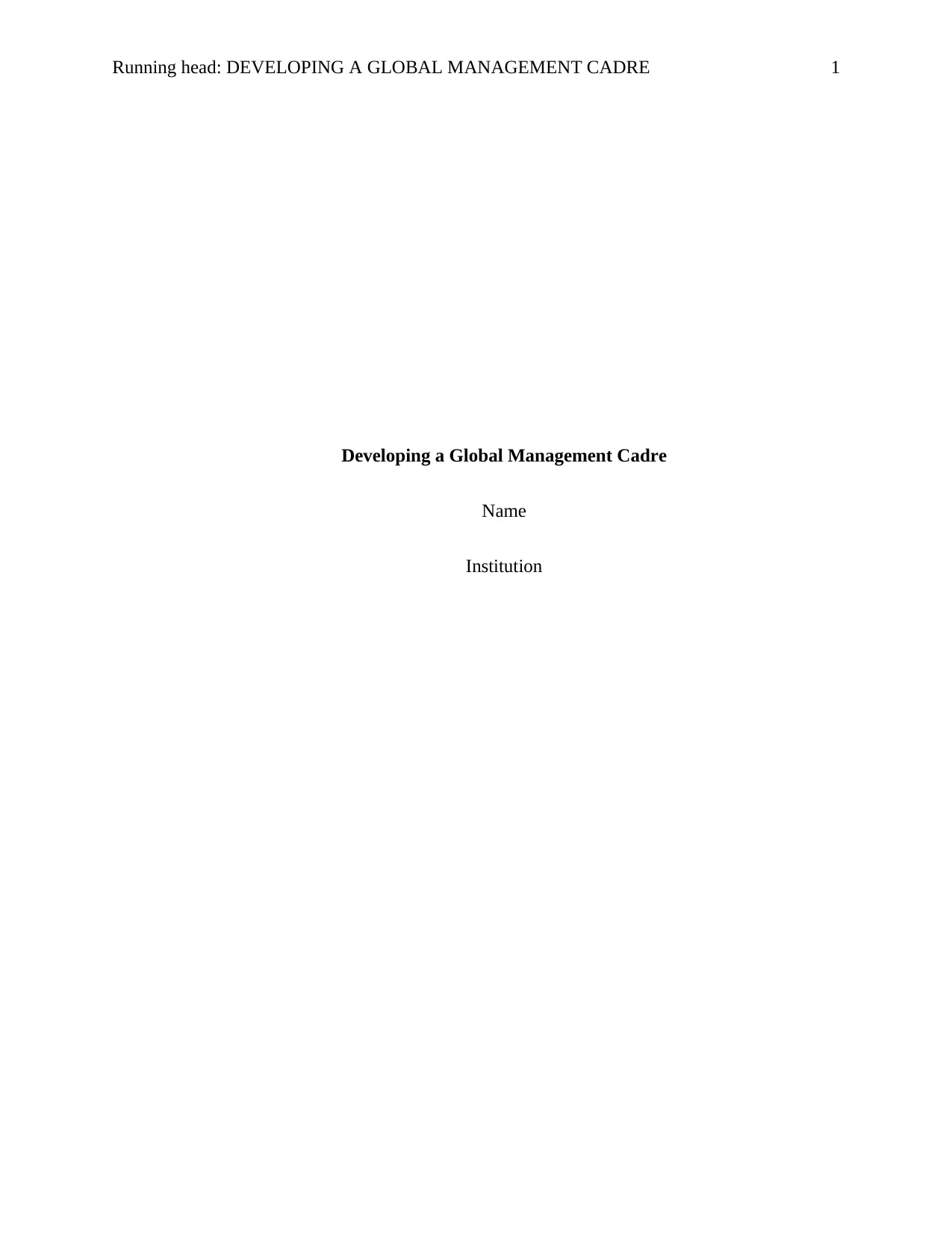
Running head: DEVELOPING A GLOBAL MANAGEMENT CADRE 1
Developing a Global Management Cadre
Name
Institution
Developing a Global Management Cadre
Name
Institution
Paraphrase This Document
Need a fresh take? Get an instant paraphrase of this document with our AI Paraphraser
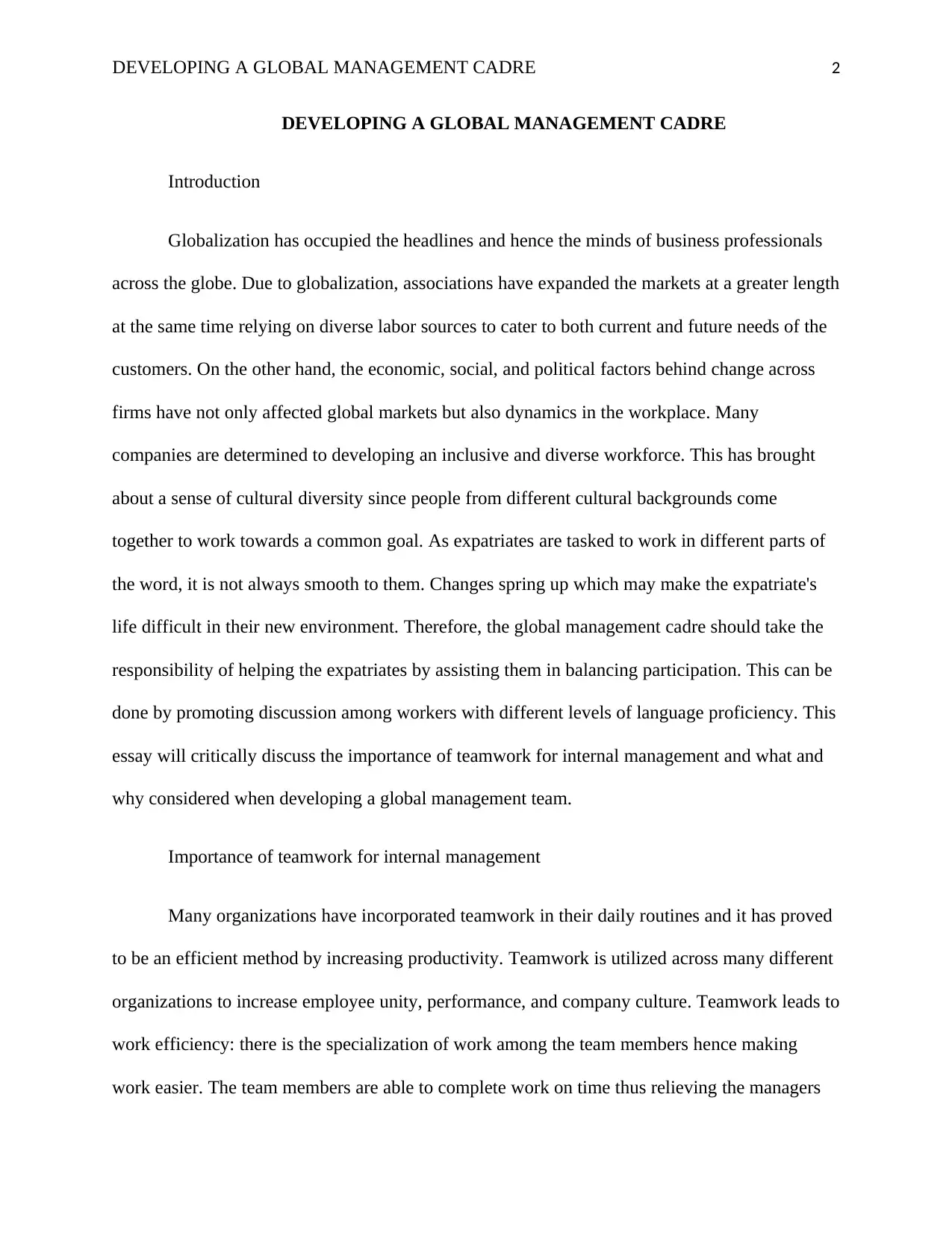
DEVELOPING A GLOBAL MANAGEMENT CADRE 2
DEVELOPING A GLOBAL MANAGEMENT CADRE
Introduction
Globalization has occupied the headlines and hence the minds of business professionals
across the globe. Due to globalization, associations have expanded the markets at a greater length
at the same time relying on diverse labor sources to cater to both current and future needs of the
customers. On the other hand, the economic, social, and political factors behind change across
firms have not only affected global markets but also dynamics in the workplace. Many
companies are determined to developing an inclusive and diverse workforce. This has brought
about a sense of cultural diversity since people from different cultural backgrounds come
together to work towards a common goal. As expatriates are tasked to work in different parts of
the word, it is not always smooth to them. Changes spring up which may make the expatriate's
life difficult in their new environment. Therefore, the global management cadre should take the
responsibility of helping the expatriates by assisting them in balancing participation. This can be
done by promoting discussion among workers with different levels of language proficiency. This
essay will critically discuss the importance of teamwork for internal management and what and
why considered when developing a global management team.
Importance of teamwork for internal management
Many organizations have incorporated teamwork in their daily routines and it has proved
to be an efficient method by increasing productivity. Teamwork is utilized across many different
organizations to increase employee unity, performance, and company culture. Teamwork leads to
work efficiency: there is the specialization of work among the team members hence making
work easier. The team members are able to complete work on time thus relieving the managers
DEVELOPING A GLOBAL MANAGEMENT CADRE
Introduction
Globalization has occupied the headlines and hence the minds of business professionals
across the globe. Due to globalization, associations have expanded the markets at a greater length
at the same time relying on diverse labor sources to cater to both current and future needs of the
customers. On the other hand, the economic, social, and political factors behind change across
firms have not only affected global markets but also dynamics in the workplace. Many
companies are determined to developing an inclusive and diverse workforce. This has brought
about a sense of cultural diversity since people from different cultural backgrounds come
together to work towards a common goal. As expatriates are tasked to work in different parts of
the word, it is not always smooth to them. Changes spring up which may make the expatriate's
life difficult in their new environment. Therefore, the global management cadre should take the
responsibility of helping the expatriates by assisting them in balancing participation. This can be
done by promoting discussion among workers with different levels of language proficiency. This
essay will critically discuss the importance of teamwork for internal management and what and
why considered when developing a global management team.
Importance of teamwork for internal management
Many organizations have incorporated teamwork in their daily routines and it has proved
to be an efficient method by increasing productivity. Teamwork is utilized across many different
organizations to increase employee unity, performance, and company culture. Teamwork leads to
work efficiency: there is the specialization of work among the team members hence making
work easier. The team members are able to complete work on time thus relieving the managers
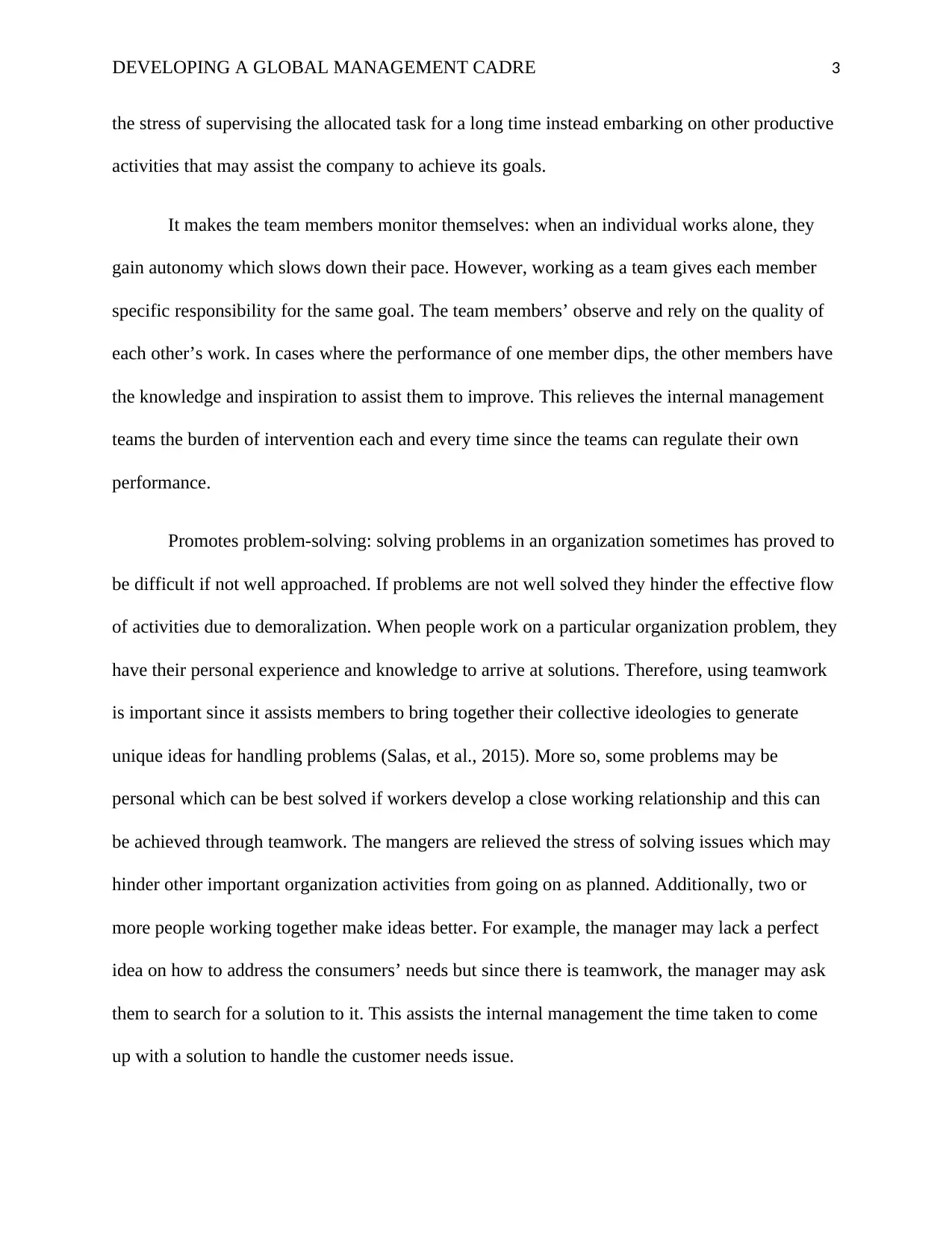
DEVELOPING A GLOBAL MANAGEMENT CADRE 3
the stress of supervising the allocated task for a long time instead embarking on other productive
activities that may assist the company to achieve its goals.
It makes the team members monitor themselves: when an individual works alone, they
gain autonomy which slows down their pace. However, working as a team gives each member
specific responsibility for the same goal. The team members’ observe and rely on the quality of
each other’s work. In cases where the performance of one member dips, the other members have
the knowledge and inspiration to assist them to improve. This relieves the internal management
teams the burden of intervention each and every time since the teams can regulate their own
performance.
Promotes problem-solving: solving problems in an organization sometimes has proved to
be difficult if not well approached. If problems are not well solved they hinder the effective flow
of activities due to demoralization. When people work on a particular organization problem, they
have their personal experience and knowledge to arrive at solutions. Therefore, using teamwork
is important since it assists members to bring together their collective ideologies to generate
unique ideas for handling problems (Salas, et al., 2015). More so, some problems may be
personal which can be best solved if workers develop a close working relationship and this can
be achieved through teamwork. The mangers are relieved the stress of solving issues which may
hinder other important organization activities from going on as planned. Additionally, two or
more people working together make ideas better. For example, the manager may lack a perfect
idea on how to address the consumers’ needs but since there is teamwork, the manager may ask
them to search for a solution to it. This assists the internal management the time taken to come
up with a solution to handle the customer needs issue.
the stress of supervising the allocated task for a long time instead embarking on other productive
activities that may assist the company to achieve its goals.
It makes the team members monitor themselves: when an individual works alone, they
gain autonomy which slows down their pace. However, working as a team gives each member
specific responsibility for the same goal. The team members’ observe and rely on the quality of
each other’s work. In cases where the performance of one member dips, the other members have
the knowledge and inspiration to assist them to improve. This relieves the internal management
teams the burden of intervention each and every time since the teams can regulate their own
performance.
Promotes problem-solving: solving problems in an organization sometimes has proved to
be difficult if not well approached. If problems are not well solved they hinder the effective flow
of activities due to demoralization. When people work on a particular organization problem, they
have their personal experience and knowledge to arrive at solutions. Therefore, using teamwork
is important since it assists members to bring together their collective ideologies to generate
unique ideas for handling problems (Salas, et al., 2015). More so, some problems may be
personal which can be best solved if workers develop a close working relationship and this can
be achieved through teamwork. The mangers are relieved the stress of solving issues which may
hinder other important organization activities from going on as planned. Additionally, two or
more people working together make ideas better. For example, the manager may lack a perfect
idea on how to address the consumers’ needs but since there is teamwork, the manager may ask
them to search for a solution to it. This assists the internal management the time taken to come
up with a solution to handle the customer needs issue.
⊘ This is a preview!⊘
Do you want full access?
Subscribe today to unlock all pages.

Trusted by 1+ million students worldwide
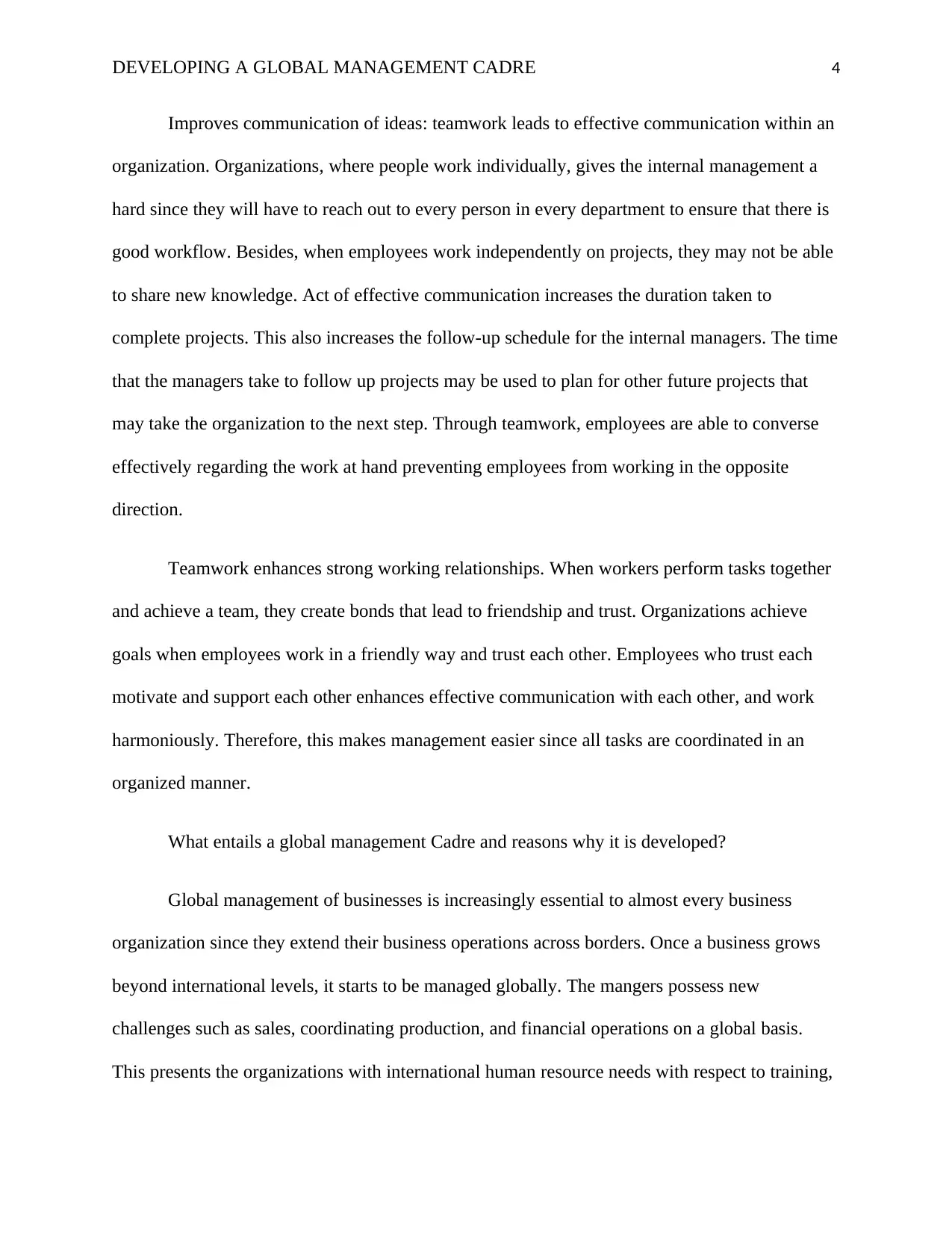
DEVELOPING A GLOBAL MANAGEMENT CADRE 4
Improves communication of ideas: teamwork leads to effective communication within an
organization. Organizations, where people work individually, gives the internal management a
hard since they will have to reach out to every person in every department to ensure that there is
good workflow. Besides, when employees work independently on projects, they may not be able
to share new knowledge. Act of effective communication increases the duration taken to
complete projects. This also increases the follow-up schedule for the internal managers. The time
that the managers take to follow up projects may be used to plan for other future projects that
may take the organization to the next step. Through teamwork, employees are able to converse
effectively regarding the work at hand preventing employees from working in the opposite
direction.
Teamwork enhances strong working relationships. When workers perform tasks together
and achieve a team, they create bonds that lead to friendship and trust. Organizations achieve
goals when employees work in a friendly way and trust each other. Employees who trust each
motivate and support each other enhances effective communication with each other, and work
harmoniously. Therefore, this makes management easier since all tasks are coordinated in an
organized manner.
What entails a global management Cadre and reasons why it is developed?
Global management of businesses is increasingly essential to almost every business
organization since they extend their business operations across borders. Once a business grows
beyond international levels, it starts to be managed globally. The mangers possess new
challenges such as sales, coordinating production, and financial operations on a global basis.
This presents the organizations with international human resource needs with respect to training,
Improves communication of ideas: teamwork leads to effective communication within an
organization. Organizations, where people work individually, gives the internal management a
hard since they will have to reach out to every person in every department to ensure that there is
good workflow. Besides, when employees work independently on projects, they may not be able
to share new knowledge. Act of effective communication increases the duration taken to
complete projects. This also increases the follow-up schedule for the internal managers. The time
that the managers take to follow up projects may be used to plan for other future projects that
may take the organization to the next step. Through teamwork, employees are able to converse
effectively regarding the work at hand preventing employees from working in the opposite
direction.
Teamwork enhances strong working relationships. When workers perform tasks together
and achieve a team, they create bonds that lead to friendship and trust. Organizations achieve
goals when employees work in a friendly way and trust each other. Employees who trust each
motivate and support each other enhances effective communication with each other, and work
harmoniously. Therefore, this makes management easier since all tasks are coordinated in an
organized manner.
What entails a global management Cadre and reasons why it is developed?
Global management of businesses is increasingly essential to almost every business
organization since they extend their business operations across borders. Once a business grows
beyond international levels, it starts to be managed globally. The mangers possess new
challenges such as sales, coordinating production, and financial operations on a global basis.
This presents the organizations with international human resource needs with respect to training,
Paraphrase This Document
Need a fresh take? Get an instant paraphrase of this document with our AI Paraphraser
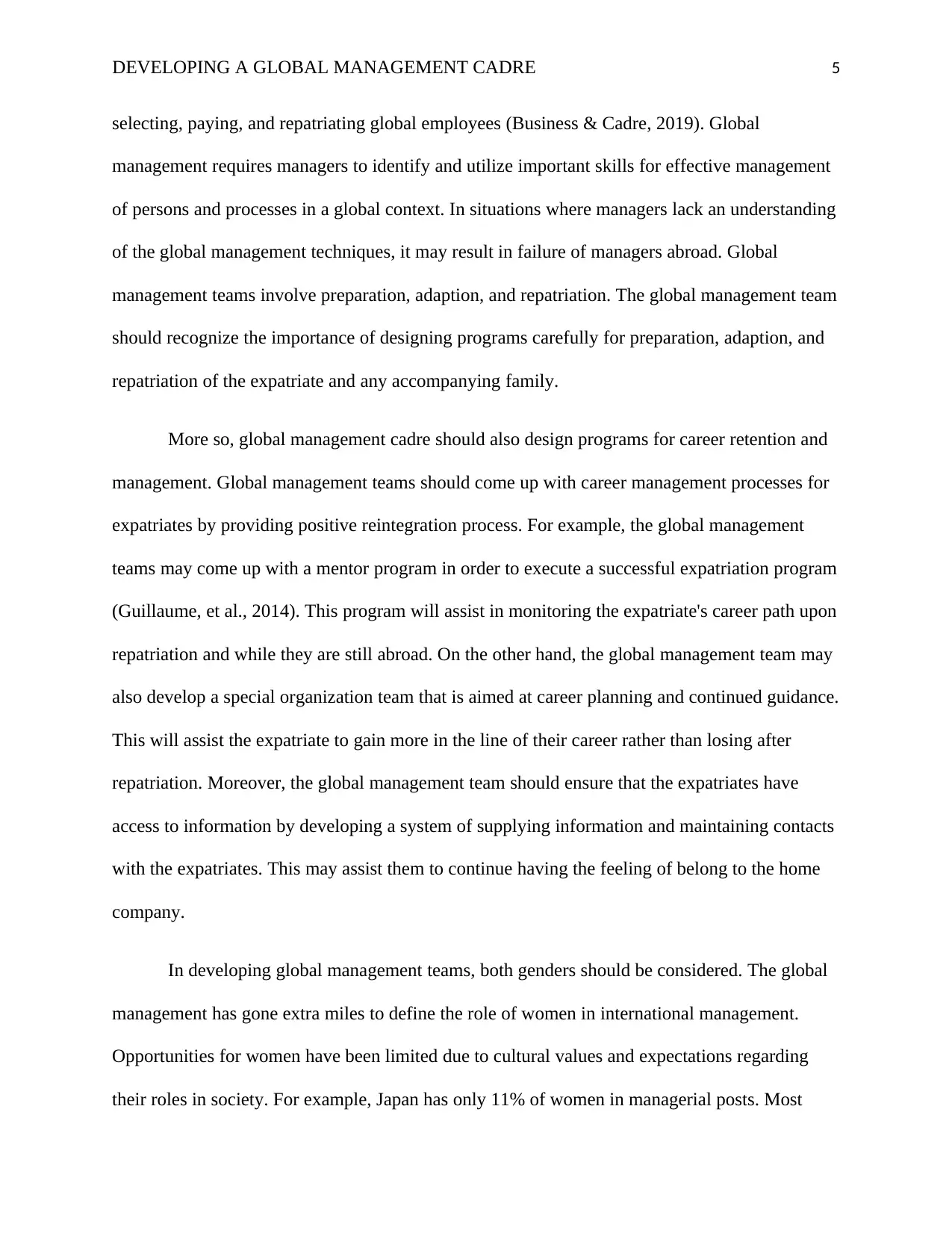
DEVELOPING A GLOBAL MANAGEMENT CADRE 5
selecting, paying, and repatriating global employees (Business & Cadre, 2019). Global
management requires managers to identify and utilize important skills for effective management
of persons and processes in a global context. In situations where managers lack an understanding
of the global management techniques, it may result in failure of managers abroad. Global
management teams involve preparation, adaption, and repatriation. The global management team
should recognize the importance of designing programs carefully for preparation, adaption, and
repatriation of the expatriate and any accompanying family.
More so, global management cadre should also design programs for career retention and
management. Global management teams should come up with career management processes for
expatriates by providing positive reintegration process. For example, the global management
teams may come up with a mentor program in order to execute a successful expatriation program
(Guillaume, et al., 2014). This program will assist in monitoring the expatriate's career path upon
repatriation and while they are still abroad. On the other hand, the global management team may
also develop a special organization team that is aimed at career planning and continued guidance.
This will assist the expatriate to gain more in the line of their career rather than losing after
repatriation. Moreover, the global management team should ensure that the expatriates have
access to information by developing a system of supplying information and maintaining contacts
with the expatriates. This may assist them to continue having the feeling of belong to the home
company.
In developing global management teams, both genders should be considered. The global
management has gone extra miles to define the role of women in international management.
Opportunities for women have been limited due to cultural values and expectations regarding
their roles in society. For example, Japan has only 11% of women in managerial posts. Most
selecting, paying, and repatriating global employees (Business & Cadre, 2019). Global
management requires managers to identify and utilize important skills for effective management
of persons and processes in a global context. In situations where managers lack an understanding
of the global management techniques, it may result in failure of managers abroad. Global
management teams involve preparation, adaption, and repatriation. The global management team
should recognize the importance of designing programs carefully for preparation, adaption, and
repatriation of the expatriate and any accompanying family.
More so, global management cadre should also design programs for career retention and
management. Global management teams should come up with career management processes for
expatriates by providing positive reintegration process. For example, the global management
teams may come up with a mentor program in order to execute a successful expatriation program
(Guillaume, et al., 2014). This program will assist in monitoring the expatriate's career path upon
repatriation and while they are still abroad. On the other hand, the global management team may
also develop a special organization team that is aimed at career planning and continued guidance.
This will assist the expatriate to gain more in the line of their career rather than losing after
repatriation. Moreover, the global management team should ensure that the expatriates have
access to information by developing a system of supplying information and maintaining contacts
with the expatriates. This may assist them to continue having the feeling of belong to the home
company.
In developing global management teams, both genders should be considered. The global
management has gone extra miles to define the role of women in international management.
Opportunities for women have been limited due to cultural values and expectations regarding
their roles in society. For example, Japan has only 11% of women in managerial posts. Most
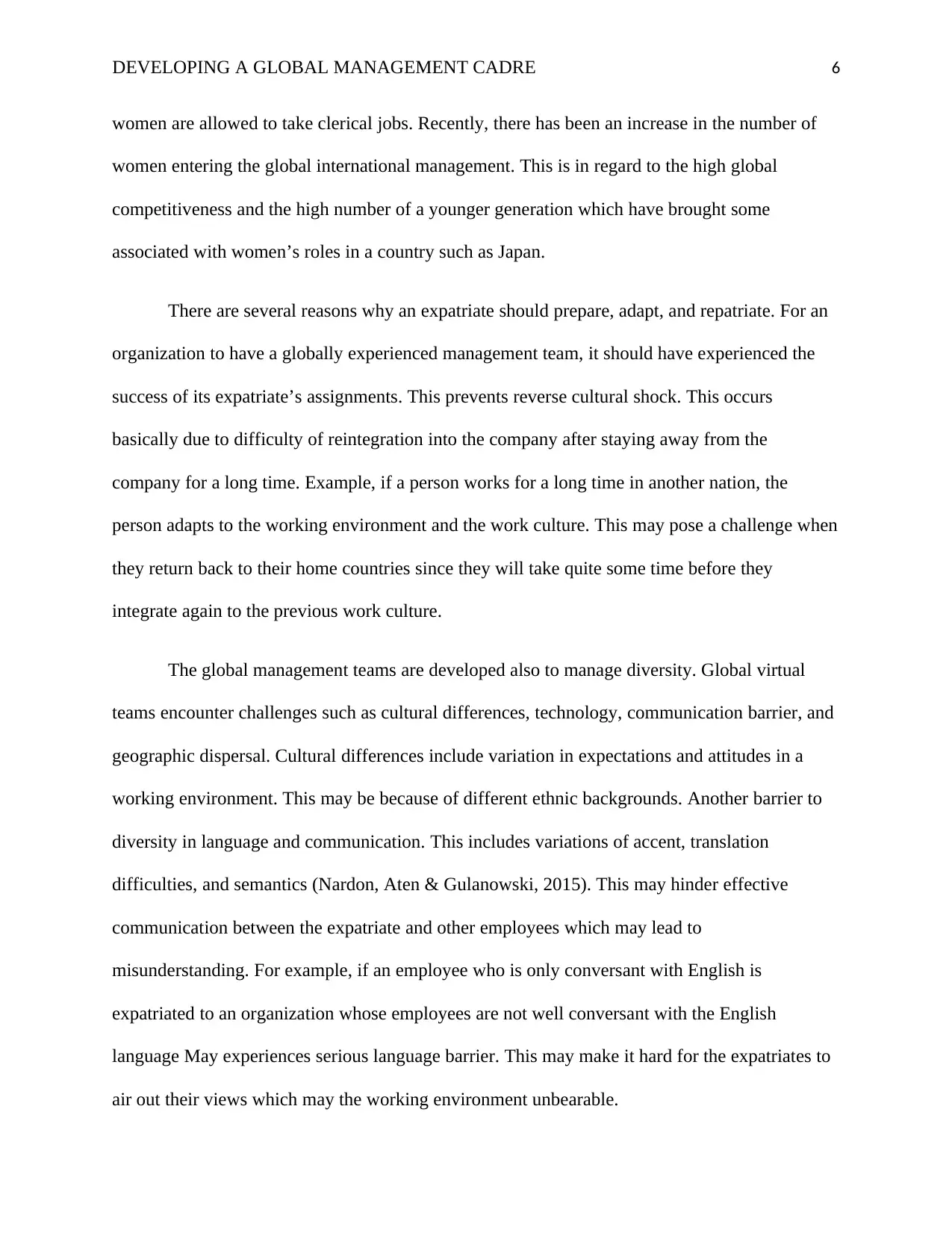
DEVELOPING A GLOBAL MANAGEMENT CADRE 6
women are allowed to take clerical jobs. Recently, there has been an increase in the number of
women entering the global international management. This is in regard to the high global
competitiveness and the high number of a younger generation which have brought some
associated with women’s roles in a country such as Japan.
There are several reasons why an expatriate should prepare, adapt, and repatriate. For an
organization to have a globally experienced management team, it should have experienced the
success of its expatriate’s assignments. This prevents reverse cultural shock. This occurs
basically due to difficulty of reintegration into the company after staying away from the
company for a long time. Example, if a person works for a long time in another nation, the
person adapts to the working environment and the work culture. This may pose a challenge when
they return back to their home countries since they will take quite some time before they
integrate again to the previous work culture.
The global management teams are developed also to manage diversity. Global virtual
teams encounter challenges such as cultural differences, technology, communication barrier, and
geographic dispersal. Cultural differences include variation in expectations and attitudes in a
working environment. This may be because of different ethnic backgrounds. Another barrier to
diversity in language and communication. This includes variations of accent, translation
difficulties, and semantics (Nardon, Aten & Gulanowski, 2015). This may hinder effective
communication between the expatriate and other employees which may lead to
misunderstanding. For example, if an employee who is only conversant with English is
expatriated to an organization whose employees are not well conversant with the English
language May experiences serious language barrier. This may make it hard for the expatriates to
air out their views which may the working environment unbearable.
women are allowed to take clerical jobs. Recently, there has been an increase in the number of
women entering the global international management. This is in regard to the high global
competitiveness and the high number of a younger generation which have brought some
associated with women’s roles in a country such as Japan.
There are several reasons why an expatriate should prepare, adapt, and repatriate. For an
organization to have a globally experienced management team, it should have experienced the
success of its expatriate’s assignments. This prevents reverse cultural shock. This occurs
basically due to difficulty of reintegration into the company after staying away from the
company for a long time. Example, if a person works for a long time in another nation, the
person adapts to the working environment and the work culture. This may pose a challenge when
they return back to their home countries since they will take quite some time before they
integrate again to the previous work culture.
The global management teams are developed also to manage diversity. Global virtual
teams encounter challenges such as cultural differences, technology, communication barrier, and
geographic dispersal. Cultural differences include variation in expectations and attitudes in a
working environment. This may be because of different ethnic backgrounds. Another barrier to
diversity in language and communication. This includes variations of accent, translation
difficulties, and semantics (Nardon, Aten & Gulanowski, 2015). This may hinder effective
communication between the expatriate and other employees which may lead to
misunderstanding. For example, if an employee who is only conversant with English is
expatriated to an organization whose employees are not well conversant with the English
language May experiences serious language barrier. This may make it hard for the expatriates to
air out their views which may the working environment unbearable.
⊘ This is a preview!⊘
Do you want full access?
Subscribe today to unlock all pages.

Trusted by 1+ million students worldwide
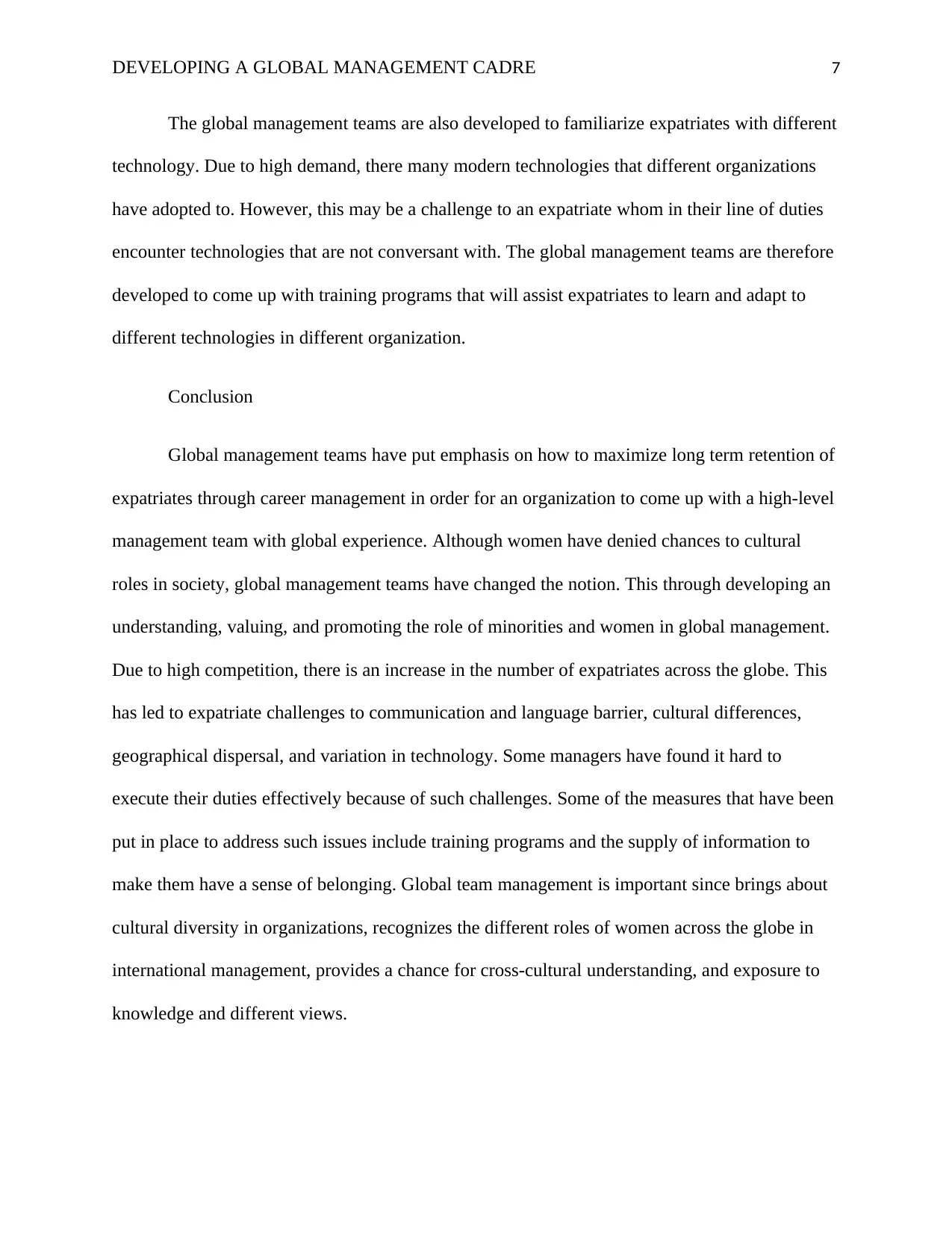
DEVELOPING A GLOBAL MANAGEMENT CADRE 7
The global management teams are also developed to familiarize expatriates with different
technology. Due to high demand, there many modern technologies that different organizations
have adopted to. However, this may be a challenge to an expatriate whom in their line of duties
encounter technologies that are not conversant with. The global management teams are therefore
developed to come up with training programs that will assist expatriates to learn and adapt to
different technologies in different organization.
Conclusion
Global management teams have put emphasis on how to maximize long term retention of
expatriates through career management in order for an organization to come up with a high-level
management team with global experience. Although women have denied chances to cultural
roles in society, global management teams have changed the notion. This through developing an
understanding, valuing, and promoting the role of minorities and women in global management.
Due to high competition, there is an increase in the number of expatriates across the globe. This
has led to expatriate challenges to communication and language barrier, cultural differences,
geographical dispersal, and variation in technology. Some managers have found it hard to
execute their duties effectively because of such challenges. Some of the measures that have been
put in place to address such issues include training programs and the supply of information to
make them have a sense of belonging. Global team management is important since brings about
cultural diversity in organizations, recognizes the different roles of women across the globe in
international management, provides a chance for cross-cultural understanding, and exposure to
knowledge and different views.
The global management teams are also developed to familiarize expatriates with different
technology. Due to high demand, there many modern technologies that different organizations
have adopted to. However, this may be a challenge to an expatriate whom in their line of duties
encounter technologies that are not conversant with. The global management teams are therefore
developed to come up with training programs that will assist expatriates to learn and adapt to
different technologies in different organization.
Conclusion
Global management teams have put emphasis on how to maximize long term retention of
expatriates through career management in order for an organization to come up with a high-level
management team with global experience. Although women have denied chances to cultural
roles in society, global management teams have changed the notion. This through developing an
understanding, valuing, and promoting the role of minorities and women in global management.
Due to high competition, there is an increase in the number of expatriates across the globe. This
has led to expatriate challenges to communication and language barrier, cultural differences,
geographical dispersal, and variation in technology. Some managers have found it hard to
execute their duties effectively because of such challenges. Some of the measures that have been
put in place to address such issues include training programs and the supply of information to
make them have a sense of belonging. Global team management is important since brings about
cultural diversity in organizations, recognizes the different roles of women across the globe in
international management, provides a chance for cross-cultural understanding, and exposure to
knowledge and different views.
Paraphrase This Document
Need a fresh take? Get an instant paraphrase of this document with our AI Paraphraser
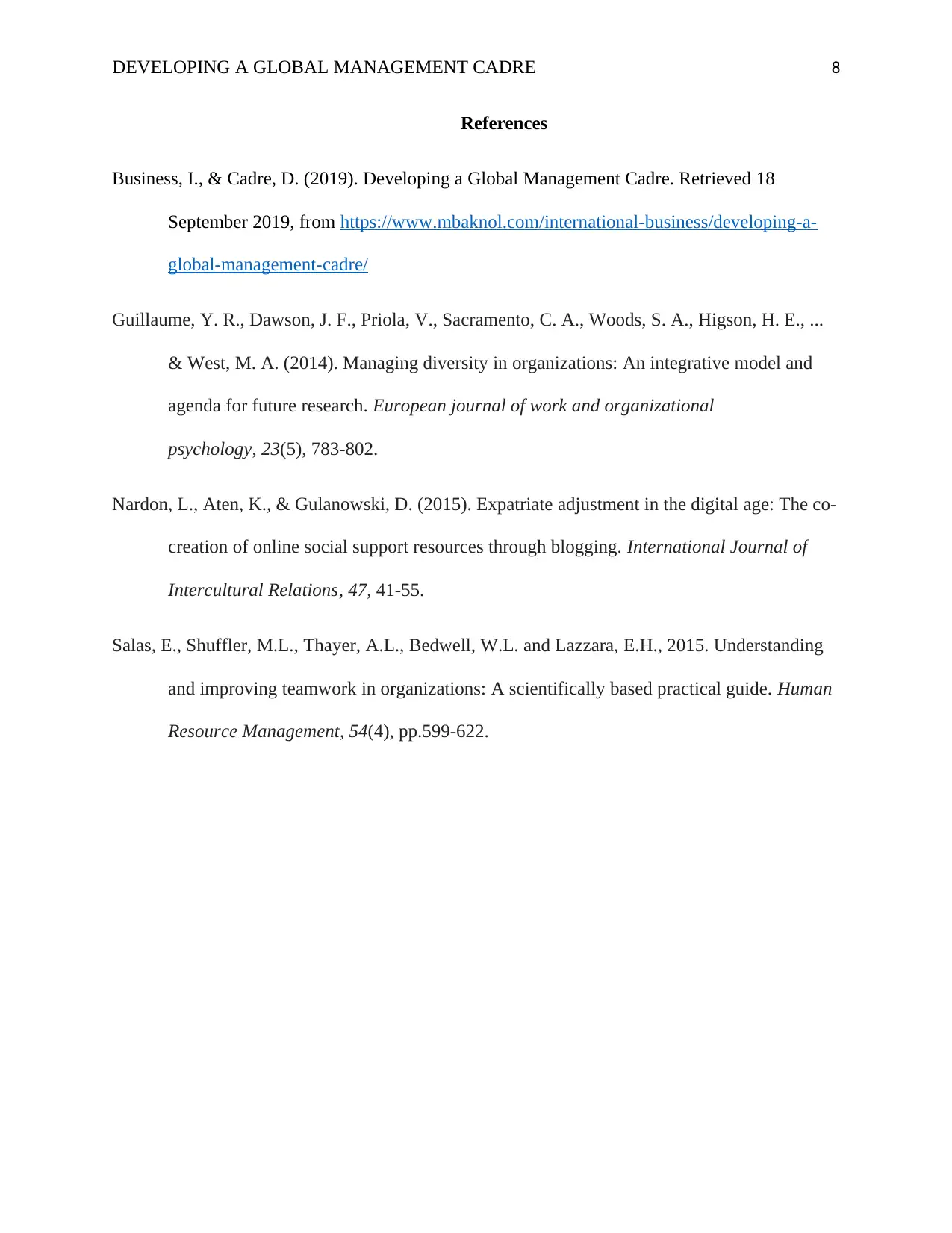
DEVELOPING A GLOBAL MANAGEMENT CADRE 8
References
Business, I., & Cadre, D. (2019). Developing a Global Management Cadre. Retrieved 18
September 2019, from https://www.mbaknol.com/international-business/developing-a-
global-management-cadre/
Guillaume, Y. R., Dawson, J. F., Priola, V., Sacramento, C. A., Woods, S. A., Higson, H. E., ...
& West, M. A. (2014). Managing diversity in organizations: An integrative model and
agenda for future research. European journal of work and organizational
psychology, 23(5), 783-802.
Nardon, L., Aten, K., & Gulanowski, D. (2015). Expatriate adjustment in the digital age: The co-
creation of online social support resources through blogging. International Journal of
Intercultural Relations, 47, 41-55.
Salas, E., Shuffler, M.L., Thayer, A.L., Bedwell, W.L. and Lazzara, E.H., 2015. Understanding
and improving teamwork in organizations: A scientifically based practical guide. Human
Resource Management, 54(4), pp.599-622.
References
Business, I., & Cadre, D. (2019). Developing a Global Management Cadre. Retrieved 18
September 2019, from https://www.mbaknol.com/international-business/developing-a-
global-management-cadre/
Guillaume, Y. R., Dawson, J. F., Priola, V., Sacramento, C. A., Woods, S. A., Higson, H. E., ...
& West, M. A. (2014). Managing diversity in organizations: An integrative model and
agenda for future research. European journal of work and organizational
psychology, 23(5), 783-802.
Nardon, L., Aten, K., & Gulanowski, D. (2015). Expatriate adjustment in the digital age: The co-
creation of online social support resources through blogging. International Journal of
Intercultural Relations, 47, 41-55.
Salas, E., Shuffler, M.L., Thayer, A.L., Bedwell, W.L. and Lazzara, E.H., 2015. Understanding
and improving teamwork in organizations: A scientifically based practical guide. Human
Resource Management, 54(4), pp.599-622.
1 out of 8
Related Documents
Your All-in-One AI-Powered Toolkit for Academic Success.
+13062052269
info@desklib.com
Available 24*7 on WhatsApp / Email
![[object Object]](/_next/static/media/star-bottom.7253800d.svg)
Unlock your academic potential
Copyright © 2020–2026 A2Z Services. All Rights Reserved. Developed and managed by ZUCOL.




